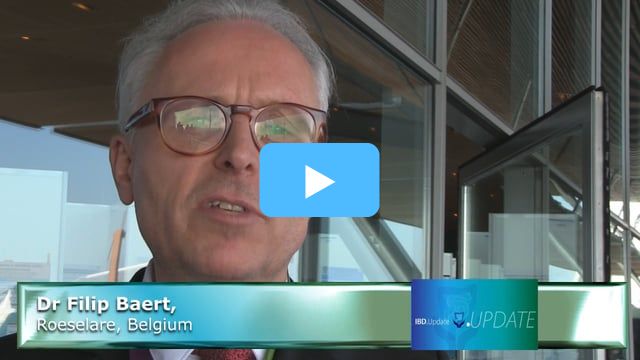Advertisment
Clinical trials vs real life

Dr Filip Baert (Roeselare, Belgium) gives a summary of his session on trial endpoints vs therapeutic objectives. he also discusses the role of ECCO in improving the data generated in IBD.
Professor David Rubin (Chicago, USA) and Dr Charlie Lees (Edinburgh, UK) give their view on the value of real world data vs trial data
Randomised clinical trials (RCTs) rarely last for more than 12 months; clinicians treating chronic conditions such as IBD therefore have to rely on observational and retrospective data for optimising outcomes in the longer term. As the criteria for remission have evolved from symptomatic remission to mucosal healing and ultimately inflammation control and disease modification, the focus is increasingly on balancing long-term efficacy against safety.
Professor Stefan Schreiber from Kiel in Germany highlighted how early therapy and a fast response can predict important disease-modifying outcomes in IBD. In the population-based IBSEN cohort study in Norway, patients who had achieved mucosal healing at one year were significantly less likely to have had a colectomy at 10 years, both in the UC (hazard ratio [HR] 0.34 [0.14, 0.86]; p<0.02)1 and CD (HR 0.42 [0.20, 0.89]; p=0.027)2 cohorts. This is consistent with findings from RCTs with biological therapies: in the ACT-1 trial, infliximab-treated UC patients who had achieved mucosal healing, defined as a Mayo endoscopy subscore of 0 or 1, at 8 weeks were less likely to have had a colectomy at week 54.3 A long-term extension in the PRECiSE study programme on certolizumab pegol found that patients who achieved remission within 6 weeks of initiating treatment were more likely to be in remission at 7 years after treatment than those who achieved remission later.4
The PRECiSE study programme also showed that newly-diagnosed patients who begin treatment with certolizumab pegol early have better outcomes than those with longer disease duration.5 The same was shown for adalimumab in a recent study in which patients who initiated treatment within 2 years from diagnosis were significantly more likely to be in remission at week 26 and week 52.6 In the Step-Up, Top-Down study CD patients who received induction infliximab therapy had numerically longer mean time to a first new fistula, first hospitalisation and first CD-related surgery, respectively.7 In the era of new biological agents, optimisation of long-term outcomes with biological therapies is increasingly focusing on drug concentration levels. In the GEMINI 1 study there was a clear relationship between vedolizumab trough levels during induction therapy and rates of clinical response and remission, with patients in the highest trough quartile having more than twice as high response rates and six-fold higher remission rates than patients in the lowest quartile.8 The recent TAXIT study showed that infliximab dose optimisation to achieve trough levels of 3-7 μg/mL was associated with higher remission rates.9 Pending long-term prospective, comparative RCTs, in Professor Schreiber’s view early therapy and dose intensification to achieve a fast response will be key to optimising long term outcomes in IBD.
Professor Gert van Assche from Leuven discussed the long-term safety beyond clinical trials. Thiopurines are known to increase the risk of serious infections and malignancies including non-melanoma skin cancer and lymphoma, especially in older patients.10 In contrast there is no clear signal from the clinical evidence that anti-TNF monotherapy increases the risk of lymphoma, although the risk of serious infection is increased.11-14 Data from the ENCORE study and TREAT registry shows that mortality is reduced in patients exposed to infliximab and there was no increased risk of malignancy.11-14 Cumulative incidence rates show no increased hazard from exposure to infliximab for up to five years.14 Nor was there any long-term safety signal in the PYRAMID registry which represents 13,924 patient years of treatment of CD with adalimumab.15
Newer biological therapies have limited real-world evidence available for determining the safety profile beyond RCTs. For ustekinumab, data from the PSOLAR registry in psoriasis shows no increased risk of developing serious infections within 91 days of treatment.16 Reports regarding an increased risk of surgical complications with vedolizumab remain controversial as the GEMINI study programme showed a reduction in the rate of infectious complications and surgical site infections both in CD and UC.17 The IBD Cancer and Serious Infections in Europe (I-CARE) study is a large prospective multicentre cohort study which has begun recruiting patients in 15 European countries. The I-CARE study will assess the safety of biological agents as monotherapy and in combination with thiopurines in total of 17,600 patients, and will be an important trial for guiding the use of biological therapy in clinical practice.
References
- Solberg IC, Lygren I, Jahnsen J, et al. Clinical course during the first 10 years of ulcerative colitis: results from a population-based inception cohort (IBSEN Study). Scand J Gastroenterol 2009;44:431-40.
- Solberg IC, Vatn MH, Hoie O, et al. Clinical course in Crohn’s disease: results of a Norwegian population-based ten-year follow-up study. Clin Gastroenterol Hepatol 2007;5:1430-8.
- Colombel JF, Rutgeerts P, Reinisch W, et al. Early mucosal healing with infliximab is associated with improved long-term clinical outcomes in ulcerative colitis. Gastroenterology 2011;141:1194-201.
- Melmed G, McGovern D, Schreiber S, et al. Sa1190 Early Remission Status As a Predictor of Long-Term Outcome in Crohn’s Disease Patients Treated With Certolizumab Pegol: Results of an Analysis From the PRECiSE 3 Study. Gastroenterology;148:S-252.
- Schreiber S, Lawrance IC, Thomsen OO, et al. Randomised clinical trial: certolizumab pegol for fistulas in Crohn’s disease – subgroup results from a placebo-controlled study. Aliment Pharmacol Ther 2011;33:185-93.
- Panaccione R, Rutgeerts P, Sandborn W, et al. P381 Adalimumab efficacy and safety by disease duration: analysis of pooled studies of Crohn’s disease. Journal of Crohn’s and Colitis 2017;11:S271-S271.
- Hoekman DR, Stibbe JA, Baert FJ, et al. OP251 LONG-TERM OUTCOMES OF TOP-DOWN VERSUS STEP-UP TREATMENT IN NEWLY DIAGNOSED CROHN’S DISEASE. United European Gastroenterology Journal 2014;2:A1-A131.
- Feagan BG, Rutgeerts P, Sands BE, et al. Vedolizumab as induction and maintenance therapy for ulcerative colitis. N Engl J Med 2013;369:699-710.
- Vande Casteele N, Ferrante M, Van Assche G, et al. Trough concentrations of infliximab guide dosing for patients with inflammatory bowel disease. Gastroenterology 2015;148:1320-9 e3.
- Kotlyar DS, Lewis JD, Beaugerie L, et al. Risk of lymphoma in patients with inflammatory bowel disease treated with azathioprine and 6-mercaptopurine: a meta-analysis. Clin Gastroenterol Hepatol 2015;13:847-58 e4; quiz e48-50.
- D’Haens G, Reinisch W, Colombel JF, et al. Five-year Safety Data From ENCORE, a European Observational Safety Registry for Adults With Crohn’s Disease Treated With Infliximab [Remicade(R)] or Conventional Therapy. J Crohns Colitis 2016.
- Lichtenstein GR, Feagan BG, Cohen RD, et al. Serious infection and mortality in patients with Crohn’s disease: more than 5 years of follow-up in the TREAT registry. Am J Gastroenterol 2012;107:1409-22.
- Lichtenstein GR, Rutgeerts P, Sandborn WJ, et al. A pooled analysis of infections, malignancy, and mortality in infliximab- and immunomodulator-treated adult patients with inflammatory bowel disease. Am J Gastroenterol 2012;107:1051-63.
- Nyboe Andersen N, Pasternak B, Basit S, et al. Association between tumor necrosis factor-alpha antagonists and risk of cancer in patients with inflammatory bowel disease. JAMA 2014;311:2406-13.
- D’Haens G, Reinisch W, Satsangi J, et al. DOP036 PYRAMID registry: an observational study of adalimumab in Crohn’s disease: Results at year 6 Journal of Crohn’s and Colitis 2015;9.
- E. Loftus J, Augustin M, Bissonnette R, et al. P626. Prevalence of inflammatory bowel disease amongst patients with psoriasis and incidence of serious infections in this subset: results from the PSOLAR Registry. Journal of Crohn’s and Colitis 2016;10:S418-S418.
- Shen B, Blake A, Lasch K, et al. Vedolizumab Use in Patients with IBD Undergoing Surgery: A Summary from Clinical Trials and Post-Marketing Experience. Advances in IBD. Orlando, FL, 2016.





